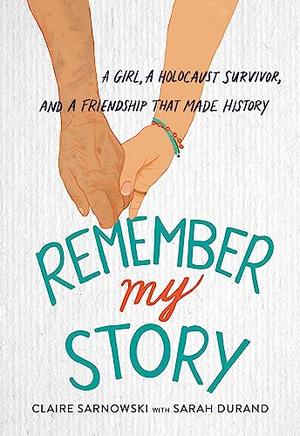Remember My Story by Claire Sarnowski with Sarah Durand recounts the memories of the author who befriends Alter Wiener, a Holocaust survivor, when she is only nine years old. The main purpose of the book is to share the truth that remembering the history of atrocities like the Jewish genocide can help prevent intolerance, violence, and hate.
After hearing Alter Wiener’s presentation about his surviving the concentration camps, Claire is inspired by his attitude to “become better, not bitter.” Despite their huge age gap—Alter is 87—the two become fast friends, and together they spread the message that we can’t remove pain by hiding the truth and that we have to process anger in order to act productively in response.
From Alter’s horrific experiences, both Claire and the reader realize that resentment and anger don’t keep you alive. Some of the other important messages include that regarding cyberbullying. Alter asks the question: “Why would you hide behind a false identity in order to inflict cruelty on another person?” (59). Another key piece of advice from Alter suggests “the wisest person is someone who learns from somebody else’s experiences” (139).
Even though antisemitism and hate speech may not be directed specifically at us doesn’t mean we should let it pass. From the two protagonists, readers learn that we’re never too young to learn about kindness, tolerance, acceptance, embracing diversity, and anti-bullying. After all, “these are the principles that can help prevent genocide” (101).
Together, Alter and Claire push for legislation to mandate Holocaust education in the state of Oregon. As Claire moves through elementary school and enters middle school, she realizes that young people are quick to form cliques, and often those groups center around good looks, popularity, or how much money you were raised with. . . . [However, young people can bond] through mutual passions and shared causes” (164).
Sarnowski’s memoir is a powerful story. On the journey to the passage of Senate Bill 664 in Oregon, Claire brings to light not only the genocides of the past but those more recent in Myanmar, Bosnia, Turkey, and Rwanda. The book cautions against comparing acts of genocide, however, saying: “Atrocities are atrocities no matter what (167). If students learn about the strength and resilience of the human spirit after war or genocide, they’ll [hopefully] feel empowered to act. [After all,] everyone wants to know that beauty can grow from darkness” (168).
- Posted by Donna

